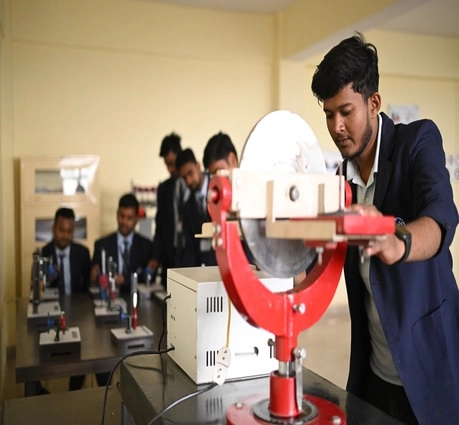Mechanical Engineering is a core discipline that leverages principles of physics and materials science to design, analyze, manufacture, and upkeep mechanical systems. This field involves harnessing heat and mechanical energy for applications like household appliances. Proficiency in this area depends on a strong grasp of mechanics, kinematics, thermodynamics, materials science, and structural analysis. Mechanical engineers apply these fundamentals, along with advanced tools such as computer-aided design (CAD), to evaluate and optimize diverse systems—including power plants, industrial equipment, HVAC systems, transportation networks, aircraft, and marine vessels
Duration of programme
Level of Study

Diploma in Mechanical Engineering applies the knowledge of science and engineering to provide the solution of Industries need.
Course design mainly focus on design, analysis and conduct investigation of complex problem of mechanical systems.
Integrates engineering principles with industrie skill for practical applications
Materials Science: Properties of Engineering Materials, Manufacturing Processes.
PO-1-Engineering knowledge: Apply the knowledge of mathematics, science, engineering fundamentals, and an engineering specialisation for the solution of complex engineering problems
PO-2-Problem analysis: Identify, formulate, research literature, and analyse complex engineering problems reaching substantiated conclusions using first principles of mathematics, natural sciences, and engineering sciences.
PO-3-Design/Development of Solutions: Design solutions for complex engineering problems and design system components or processes that meet the specified needs with appropriate consideration for public health and safety, and cultural, societal, and environmental considerations.
PO-4-Conduct investigations of complex problems: Use research-based knowledge and research methods including design of experiments, analysis and interpretation of data, and synthesis of the information to provide valid conclusions.
PO-5-Modern tool usage: Create, select, and apply appropriate techniques, resources, and modern engineering and IT tools including prediction and modelling to complex engineering activities with an understanding of the limitations.
PO-6-The engineer and society: Apply reasoning informed by the contextual knowledge to assess societal, health, safety, legal, and cultural issues and the consequent responsibilities relevant to the professional engineering practice.
PO-7-Environment and sustainability: Understand the impact of the professional engineering solutions in societal and environmental contexts, and demonstrate the knowledge of, and the need for sustainable development.
PO-8-Ethics: Apply ethical principles and commit to professional ethics and responsibilities and norms of the engineering practice.
PO-9-Individual and team work: Function effectively as an individual, and as a member or leader in diverse teams, and in multidisciplinary settings.
PO-10-Communication: Communicate effectively on complex engineering activities with the engineering community and with the society at large, such as being able to comprehend and write effective reports and design documentation, make effective presentations, and give and receive clear instructions.
PSO-1-The graduate shall be effectively use the
various tool and Software in the design and Analysis in Mechanical field
PSO-2-The Graduate shall be Identify and select appropriate
manufacturing processes, tooling, machinery and apply quality control methods
for production of various components and systems.
10th from any Recognised Board
with a minimum of 35% marks